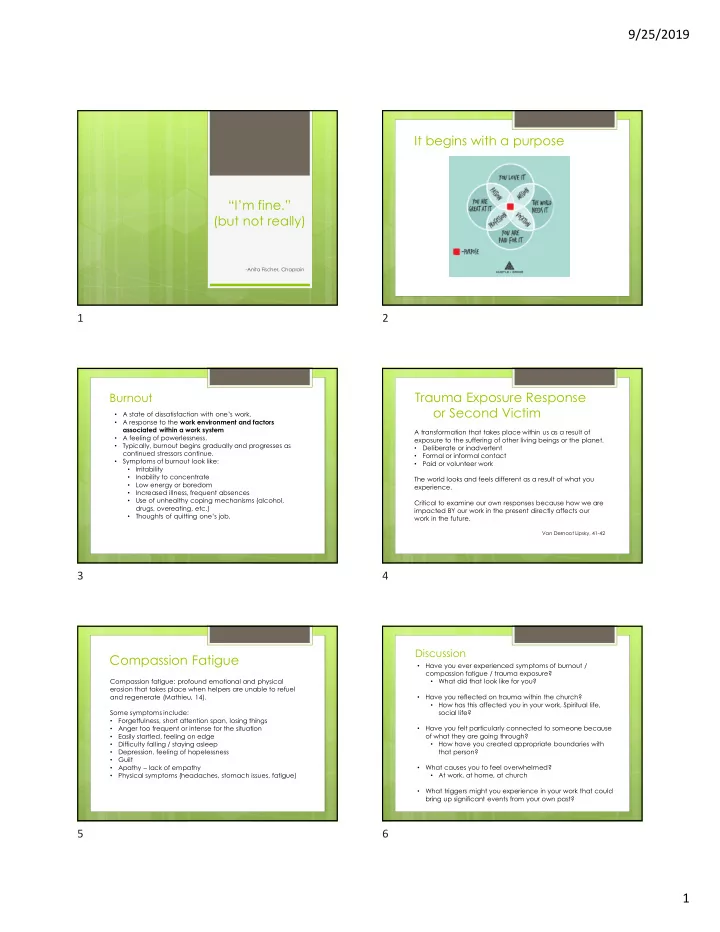

9/25/2019 It begins with a purpose “I’m fine.” (but not really) -Anita Fischer, Chaplain 1 2 Trauma Exposure Response Burnout or Second Victim A state of dissatisfaction with one’s work. • • A response to the work environment and factors associated within a work system A transformation that takes place within us as a result of A feeling of powerlessness. • exposure to the suffering of other living beings or the planet. • Typically, burnout begins gradually and progresses as • Deliberate or inadvertent continued stressors continue. Formal or informal contact • Symptoms of burnout look like: • • Paid or volunteer work • Irritability Inability to concentrate • The world looks and feels different as a result of what you Low energy or boredom • experience. • Increased illness, frequent absences Use of unhealthy coping mechanisms (alcohol, • Critical to examine our own responses because how we are drugs, overeating, etc.) impacted BY our work in the present directly affects our • Thoughts of quitting one’s job. work in the future. Van Dernoot Lipsky, 41-42 3 4 Discussion Compassion Fatigue • Have you ever experienced symptoms of burnout / compassion fatigue / trauma exposure? Compassion fatigue: profound emotional and physical What did that look like for you? • erosion that takes place when helpers are unable to refuel and regenerate (Mathieu, 14). Have you reflected on trauma within the church? • How has this affected you in your work, Spiritual life, • Some symptoms include: social life? Forgetfulness, short attention span, losing things • Anger too frequent or intense for the situation • Have you felt particularly connected to someone because • • Easily startled, feeling on edge of what they are going through? Difficulty falling / staying asleep How have you created appropriate boundaries with • • Depression, feeling of hopelessness that person? • • Guilt Apathy – lack of empathy What causes you to feel overwhelmed? • • Physical symptoms (headaches, stomach issues, fatigue) • At work, at home, at church • What triggers might you experience in your work that could • bring up significant events from your own past? 5 6 1
9/25/2019 What is Resilience? Internet Definition: Resilience is the capacity to recover quickly from difficulties; the ability of a substance or object to spring back into shape; elasticity. My Definition: The ability to restore equilibrium (balance) after distressing / stressful events Physical • • Mental Emotional • Spiritual • • Social Not “one size fits all” • From facebook site: Spiritual Humor 7 8 Professional Strategies for Resilience Strategies for Resilience What tools in your life have you found that helps you to • release stress? • Accept your reactions as normal. Support system – a safe place to vent • What can you do at the end of a stressful day to leave • Professional feedback and discussion • work at work? What about home at home? • Professional recognition Personal / Professional rituals Regular debriefing • • Mantras / Meditation / Prayer • Group counseling • • Acknowledge grief when experiencing a loss In what ways can you lift each other up in your work? Maintain professional boundaries and set limits. • • • Professional rituals – leave work at work • What does your “self talk” look like when you feel you have made a mistake or “failed.” 9 10 When all else fails, laugh a little Personal Strategies for Resilience Solitude • Find time for breaks / vacation • • Examine, “What can I change and what can’t I change? • Eat healthy and exercise. Get enough sleep. Nurture supportive relationships: • • family, friends, professional colleagues. Nurture your spirituality • Engage in meditative activities – reboot! • • Rediscover your roots. Recommit yourself to ministry yearly (Chrism Mass) • Remember the value, importance and meaning of • your work. Continuous reframing • seeing positive amongst the negative • • Sense of humor Ability to laugh at oneself 11 12 2
9/25/2019 Sources Absolon, P, RN, MA, OCN, ANP-BC and Krueger C. LCSW, 2009, • ‘Compassion Fatigue Nursing Support Group in Ambulatory Care Gynecology/Oncology Nursing’, Society of Gynecologic Nurse Oncologists 19:1 . Doolittle, B.R., 2015, ‘Burnout, compassion fatigue and job satisfaction • among hospital chaplains: A systematic review’, Research in the social scientific study of religion 26, pg 180-197. • Kelly, L.A, RN, PhD, and Lefton, C, RN, PhD, 2017, ‘Effect of Meaningful Recognition on Critical Care Nurses’ Compassion Fatigue’, American Journal of Critical Care 26 (6). http://ajcc.aacnjournals.org Louw, D.J., 2015, ‘Compassion fatigue: Spiritual exhaustion and the • cost of caring in the pastoral ministry. Towards a “pastoral diagnosis” in caregiving’, HTS Teologiese Studies/Theological Studies 71(2), Art. #3032, 10 pages. http://dx.doi.org/10.4102/hts.v71i2.3032 Mathieu, F., 2012, The Compassion Fatigue Workbook, Routledge, New • York, NY. • Van Dernoot Lipsky, L., 2009, ‘Trauma Stewardship: An Everyday Guide to Caring for Self while Caring for Others,’ Berrett-Kohler Publishers, Oakland, CA. 13 14 3
Recommend
More recommend